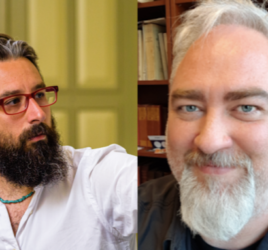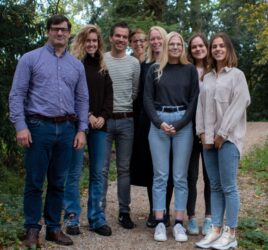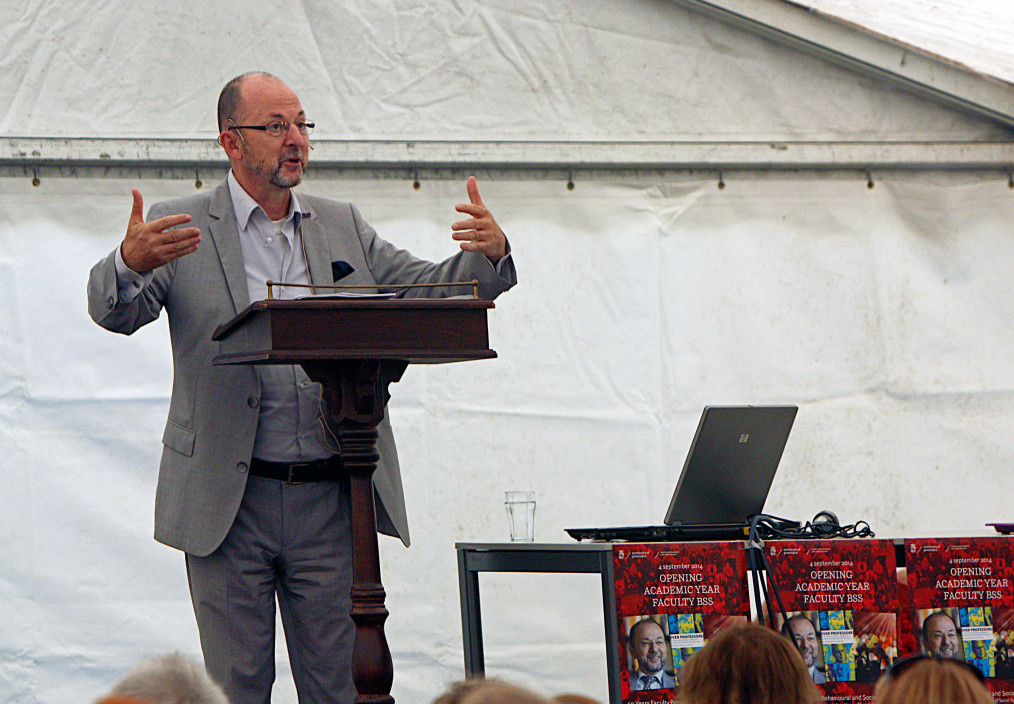
Social Sciences: Past, Present, and Future
The canvasses of the big tent placed in the garden of the faculty had to be opened very early. This was not just a consequence of the good weather and the warm sunlight, but more so of the large number of people attending the ceremony for the opening of the new academic year on September 4 2014. Not only had all seats been taken, but people were crowding in the back to attend the celebration as well.
Fifty Years of Behavioral and Social Sciences
And indeed, the reasons to celebrate were many, as the faculty turned fifty this year. Both a documentary and an edited volume on its history were presented to the public for the very first time. Furthermore, the keynote lecture by Paul Schnabel, who influenced the development of the social sciences in the Netherlands and beyond throughout the previous decades, posed a thought-provoking intellectual highlight of the afternoon.
The ceremony was opened by the faculty’s Dean, Henk Kiers, who especially welcomed the former colleagues who have shaped the life at and of the faculty in the years past, some of whom witnessed its whole fifty-year-period from inception to present day.
Once Spread Apart, Now Joined Together
In the Dutch documentary “50 years Behavioral and Social Sciences” (50 jaar GMW) Douwe Draaisma, chair for the history of psychology, took the viewers through the City of Groningen, to the different locations the pedagogical, psychological, and sociological institutes had been located at before they jointly moved to the present location around the Old Botanical Garden (Hortus Botanicus) between the Grote Rozenstraat and the Grote Kruisstraat.
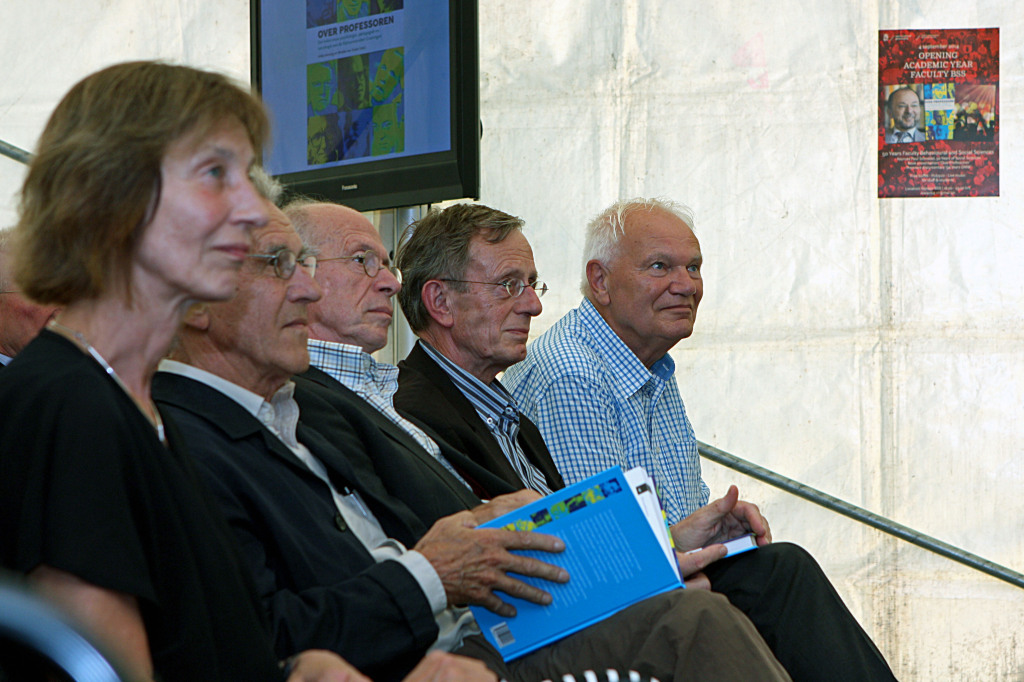
Former colleagues who have shaped the live of and at the faculty came to celebrate with the present employees (from right to left): Gert Visser, director of the documentary, the three former Deans Bert Creemers , Jules Peschar, and Gerrit Lang. Next to them sits the present Vice-Dean Greetje Timmerman.
Former faculty member Gert Visser, who compiled the material for the documentary and also presented it to the public during the opening ceremony, emphasized the fierce competition or perhaps even open hostility that existed between the professors of the different institutes during the early days. The film included original footage that gave the audience an impression of what academia was like many decades ago: Most notably faculty members and students alike were active in organizing their daily routine democratically. Everything was debatable and indeed debated, it seemed.
About Professors
Right after the documentary was shown, the two editors of the book “About Professors” (Over Professoren: Een halve eeuw psychologie, pedagogiek en sociologie aan de Rijksuniversiteit Groningen, 2014), Hilda Amsing and Mineke van Essen, summarized their work and emphasized the contributions of the nine authors and five scientific advisors. At the end of their presentation, they gave the very first copies of the work portraying nine influential professors of past fifty years of the faculty to the former Deans who had come to celebrate the anniversary together with the present employees.
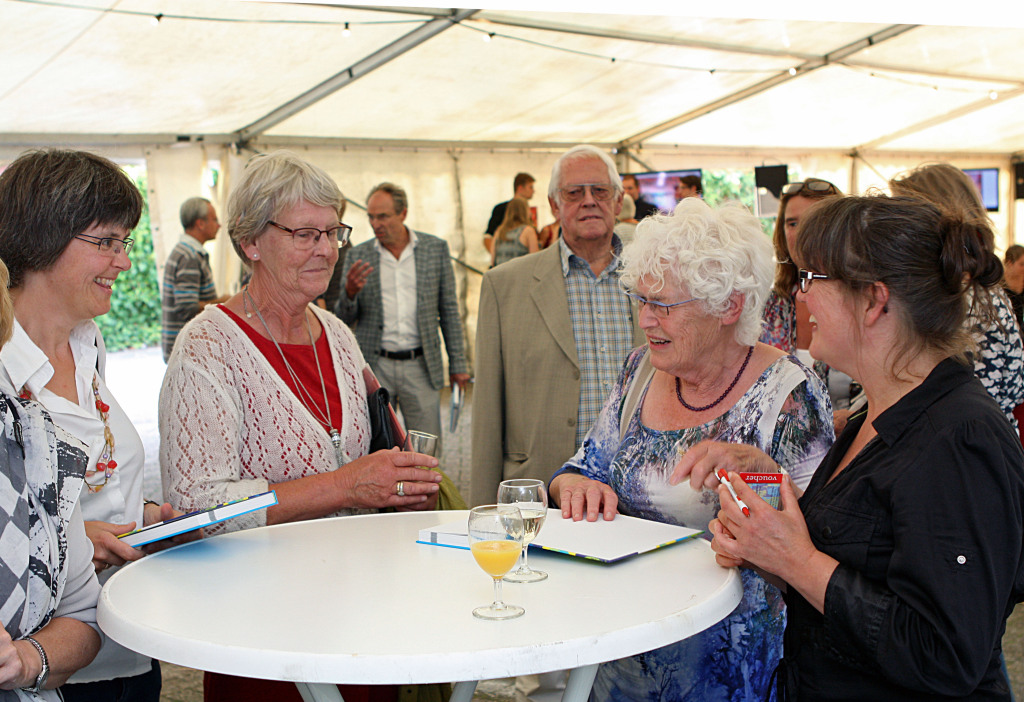
The two editors of the book Onder Professoren, Mineke van Essen and Hilda Amsing (from right to left), signed copies after the formal part of the opening ceremony.
It was no coincidence, the editors told us, that they chose this title reminiscent of a book by one of the most important Dutch novelists of the twentieth century, who actually had been a colleague at the University of Groningen from the 1950s until the 1970s: Willem Frederik Hermans. However, his novel “Among Professors” (Onder Professoren, 1975), still popular today, resembles more a requital for the frustration Hermans had experienced at the university, while the historical account “About Professors” concludes with the joint efforts, despite original competition, to put the social sciences forward in the twenty-first century, in times of globalization and internationalization.
The Eminent Keynote Speaker
The documentary and book presentation about the past fifty years paved the way for the day’s keynote lecture given by Paul Schnabel, professor at the University of Utrecht and former director of the Netherlands Institute for Social Research (Sociaal en Cultureel Planbureau). It was a task as honorable as it was challenging for the Dean to introduce a speaker with so many presently or previously held academic, governmental, and economic functions. Schnabel, originally a sociologist, had become professor for clinical psychology in 1986, and has focused on the sociology of institutions more recently. He spoke about the history of the social sciences in Groningen and also the Netherlands generally, but devoted a large part of his lecture to the present situation and the future as well.
Schnabel noted, for example, that the social sciences frequently took the perspective of the society’s poor and disadvantaged in the past, but that this has changed recently. In addition to facts and figures about the development of the faculty, he also told a couple of anecdotes that demonstrated his personal relation to the University of Groningen and in particular the Faculty of the Behavioral and Social Sciences to the audience. It may have been a surprise for some, especially the younger attendants, to learn that the former politician Pim Fortuyn, murdered in relation to his provocative theses in 2002, actually had been a teacher of Marxistic Sociology at their faculty in the 1970s. Schnabel described that Fortuyn became very popular already in those days, which caused tensions with other academics.
More Social Relevance than Often Perceived
Hardly anybody in the audience would have disagreed with the keynote speaker’s examples for the importance of the social sciences for society at large. Much to these disciplines’ disadvantage, Schnabel criticized, this public relevance would not be perceived as sufficient by political decision-makers or laypeople, in contrast to other disciplines like economics, engineering, law, or the natural sciences. Because there were no particular stereotypical job profile for social scientists, many people neglected their contributions as social and educational workers, journalists, or policy advisers, to name just a few examples.
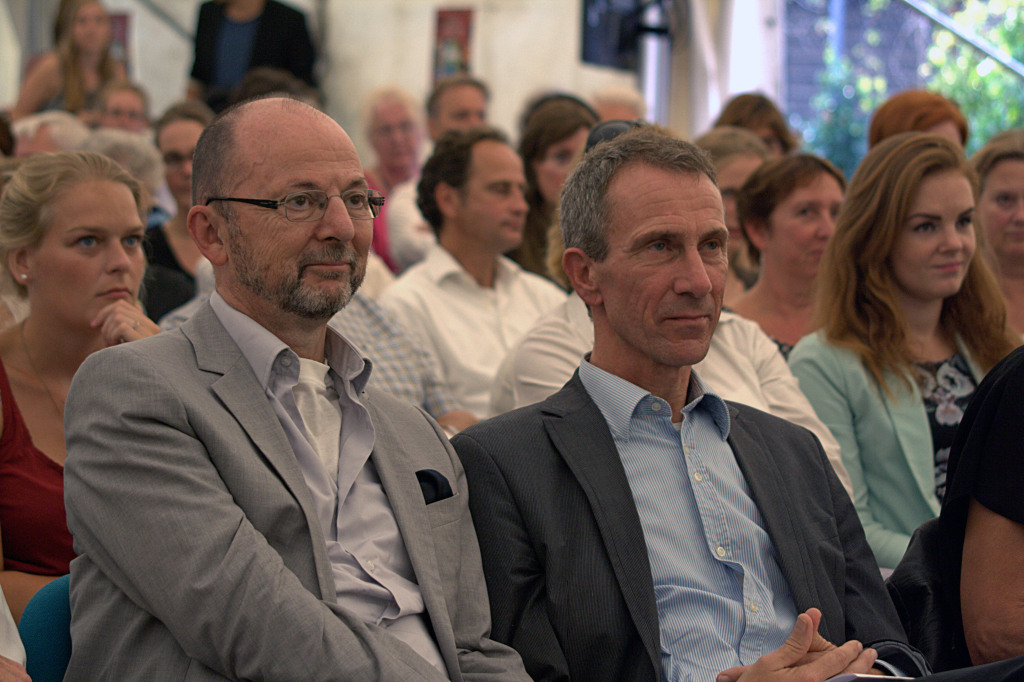
The keynote speaker from the University of Utrecht, Paul Schnabel (left, front row), and next to him the present Dean Henk Kiers. Behind Schnabel sits Fionneke Bos (left), the research master student commenting on his lecture.
Of particular concern for Schnabel were recent political developments to emphasize the economic contribution of science and to relocate ever more funds on private-public-partnerships such as with the Topsectoren policy. Because the contributions of the social sciences could not be quantified that easily, they would lose funding and thus research opportunities in spite of their high social relevance. Schnabel noted, though, that the Horizon 2020 framework on the European level offered more possibilities for researchers in the behavioral and social sciences.
A Young Research Student’s Response
After his talk, the research master student Fionneke Bos continued with a comment on the present state and the future of psychological research, as she experienced it at the University of Groningen. She started out by telling the audience how she had contact with psychologists at the faculty for the very first time, namely when she participated as a research intern in the basement of the Heymans Building. Although this experiment involved painful stimulation, she explained, she became fascinated by how researchers tried to understand the human mind.
However, it worried her nowadays that the staff members she got to know as teachers, supervisors, or mentors, seemed to be so busy with publishing papers and writing research grants all of the time. She wondered when they actually had time to think about what they are doing. Bos also expressed her concern that there were not more opportunities for educational and research activities in small groups for those students not part of the Honours Program. Nevertheless, she expressed much fascination for her study, particularly with respect to new methodological developments to understand individual psychological differences better.
Food for Body and Mind
In so doing and perhaps unbeknownst to her, she related to the scientific history in Groningen way before the last fifty years being celebrated on this day: For Gerard Heymans (1857-1930) who established experimental psychology in Groningen and the Netherlands in 1892, already put forward research on what we nowadays call the psychology of individual differences.
After so much food for thought on the past, present, and future of the social sciences, the Dean eventually concluded the formal part of the opening ceremony to allow the audience to help themselves with some rather physical food at the buffet that had already been prepared by the colleagues of the catering service.
Thanks to Sander van Lien for the photographs and Douwe Draaisma as well as Paul Schnabel for feedback on an earlier version of this post.


